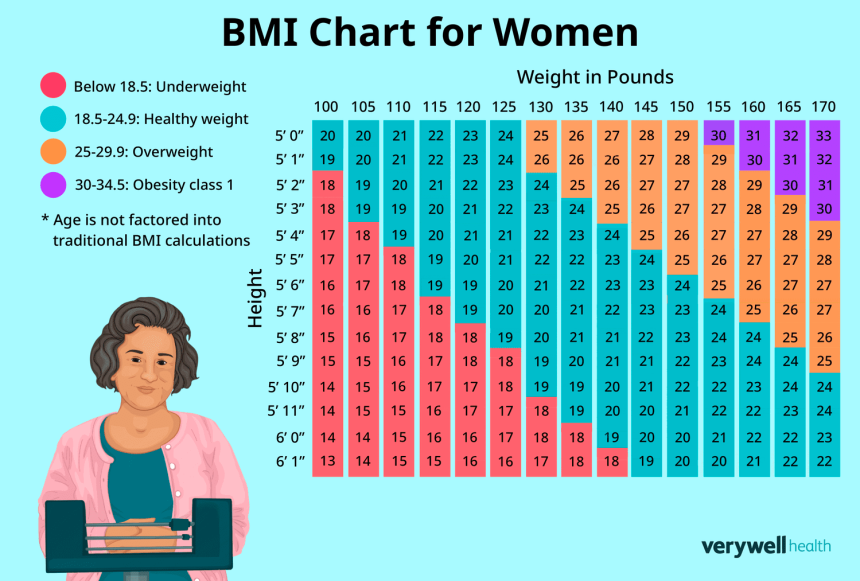Maintaining a healthy weight and eating a balanced diet are essential components of overall health and well-being. One way to assess if you’re within a healthy weight range is by calculating your Body Mass Index (BMI). Additionally, nutrition plays a key role in maintaining a healthy lifestyle. In this article, we’ll guide you through calculating your BMI and provide essential tips for eating a balanced diet.
How to Calculate Your BMI:
Body Mass Index (BMI) is a simple method used to assess whether you are underweight, normal weight, overweight, or obese based on your height and weight. It is calculated using the following formula:
\text{BMI} = \frac{\text{weight (kg)}}{\text{height (m)}^2}
Step-by-Step Guide:
- Measure your weight: Get your weight in kilograms (kg).
- Measure your height: Measure your height in meters (m). To convert from centimeters to meters, divide your height by 100.
- Apply the BMI formula: Insert your weight and height into the BMI formula to calculate your BMI.
For example, if you weigh 70 kg and are 1.75 meters tall:
\text{BMI} = \frac{70}{(1.75)^2} = \frac{70}{3.0625} = 22.86
BMI Categories:
Underweight: BMI less than 18.5
Normal weight: BMI between 18.5 and 24.9
Overweight: BMI between 25 and 29.9
Obesity: BMI 30 or higher
The Importance of Nutrition for Health:
A well-balanced diet is essential for good health. Nutrition influences everything from energy levels to immune system function and long-term well-being. Here’s what you need to know to build a nutritious, balanced diet:
- Fruits and Vegetables:
Fruits and vegetables are rich in vitamins, minerals, antioxidants, and fiber. They are essential for healthy digestion and boosting your immune system. Including a variety of colorful fruits and vegetables can reduce the risk of chronic diseases and keep your body energized.
Examples: Berries, apples, leafy greens, carrots, broccoli, and bell peppers.
- Proteins:
Proteins are the building blocks of muscles, tissues, and cells. They help with muscle repair, growth, and immune function. Choose lean proteins to avoid excess unhealthy fats. Protein-rich foods can also help keep you feeling full for longer.
Examples: Chicken breast, turkey, eggs, beans, lentils, and fish like salmon.
- Whole Grains:
Whole grains are packed with fiber and important nutrients like B vitamins and iron. They help regulate blood sugar levels, support heart health, and improve digestion. Whole grains are a better choice than refined grains because they contain more fiber and essential nutrients.
Examples: Quinoa, brown rice, whole wheat bread, oats, and barley.
- Healthy Fats:
Incorporating healthy fats into your diet is vital for brain function, heart health, and maintaining healthy skin. Unlike unhealthy trans fats, healthy fats help regulate cholesterol levels and reduce inflammation.
Examples: Avocados, olive oil, nuts, seeds, and fatty fish like mackerel or sardines.
- Dairy or Dairy Alternatives:
Dairy products are an excellent source of calcium, which is essential for strong bones. If you prefer plant-based options, choose dairy alternatives that are fortified with calcium and other important nutrients.
Examples: Greek yogurt, low-fat cheese, almond milk, or soy milk.
- Hydration:
Water is essential for overall health. It supports digestion, keeps the skin healthy, and helps your body detoxify. Staying hydrated also boosts energy levels and helps maintain mental clarity throughout the day.
Tip: Aim to drink at least 8 glasses of water per day (about 2 liters). You may need more if you are physically active or in a hot climate.
- Portion Control:
While eating healthy foods is important, portion control also plays a key role in maintaining a healthy weight. Even healthy foods can contribute to weight gain if eaten in excess. Be mindful of portion sizes, especially when consuming calorie-dense foods like nuts and oils.
- Limit Processed Foods:
Reduce your intake of processed foods and sugary drinks, which can contribute to weight gain and increase the risk of chronic diseases like heart disease and diabetes. Processed meats and high-sugar snacks should be consumed in moderation.
Conclusion: Fuel Your Body with Balanced Nutrition
Maintaining a healthy weight and eating a balanced diet are fundamental to leading a healthy life. By calculating your BMI regularly and incorporating nutritious foods such as fruits, vegetables, lean proteins, whole grains, and healthy fats, you’ll be providing your body with the necessary nutrients for optimal functioning.
Remember, healthy nutrition is not just about what you eat, but how you eat. Make mindful choices, stay hydrated, and engage in regular physical activity to support a healthy lifestyle and improve your overall well-being.





